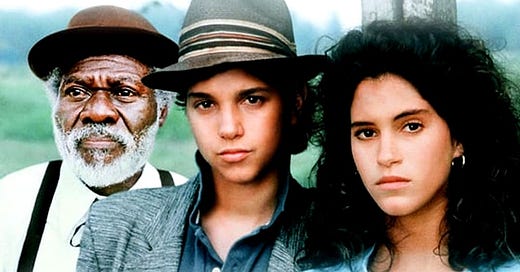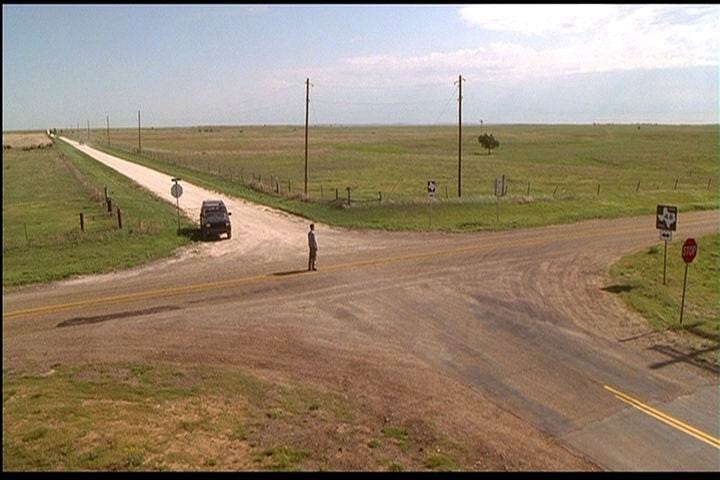The Movie That Cemented My Obsession With Music
Monday is Movies. Today's a holiday in New Zealand. Happy Holiday!
The movie Crossroads is one of my all-time favourites. That doesn’t mean it’s a good movie. But it is a great movie in my life. And I’ve had conversations with a few people that consider it truly special in their lives also. It no doubt unleashed far too many terrible, wannabe guitar-heroes into this world. But it also, hopefully, helped a lot of people to find a joy and passion in and with music.
It is the movie that cemented my obsession with music.
I hold dear the memory of Crossroads. The experience of finding it. The camaraderie in its initial screening. And then the special, secret obsession of it. The rewatching, occasionally getting to introduce somebody to it. And then the fingers-crossed moment of wondering (hoping) that they would get into it on the level that you did.
I just have such huge memories of this film because I watched it so many times. And it meant a lot to me.
Crossroads is a fictional account tracing around the surrounding myth of the 29 songs recorded by blues legend Robert Johnson.
Importantly, it stars Ralph Macchio. It was made in 1986. Macchio, at the time of this movie, was a pretty big deal. He had been in a certain “waxon wax-off” movie. And its sequel was made right around the time of Crossroads. I didn’t see Crossroads until 1990, by which time I had been to the State Movie Theatre in Hastings on a Friday night to see The Karate Kid III. So Ralph Macchio was as good as owning a whole set of Garbage Pail Kids bubblegum cards at that time.
The movie sees Macchio repeating the gimmick of The Karate Kid’s storyline. Pat Morita is replaced by Joe Seneca. And karate subs out to the blues. Oh, and the film’s climax will see Macchio’s character use a piece of wisdom learned early in the film.
There is some truly awful dialogue and scenes in the film that made me cringe when I first watched it over 20 years ago. Macchio leans in to kiss Jami Gertz. She plays a runaway hitcher they meet out on the road. He slips a peck on her lips and she says, “that was nice”. I still curl my toes when this happens. Not because you shouldn’t try and kiss someone like Jami Gertz (she was in The Lost Boys after all) but because it is just an awkward piece of writing. But it’s great. It’s part of the film. And I love all parts of this film.
I recorded it from late-night TV, sometime in 1991. Stayed up and watched it all the way through because I didn’t dare trust the VCR-timer. And so that was the second time I watched it. Ripped through it again the next day. And from there, the odyssey really took off. Right through High School this film was among my favourites.
I tell you now, this film is still magic. I love it. And as I sat trying to work out what it was I liked about it, while happy to just like it for the sake of nostalgia at the same time, I managed to put my finger on it. This film introduced me to a lot of things within music. And I followed up. Did the homework. The first, obvious example is the character of Robert Johnson and the aura of his music; really they are only peripheral in the film, but I had been reading Guitar World interviews that kept mentioning the name Robert Johnson and it was around this time that The Complete Recordings was released. So that was purchased (on cassette). And, already a fan of Joe Satriani I loved watching Steve Vai appear as the character Jack Butler in the movie. I would go on to a cassette copy of Passion and Warfare. And the music from the film, the actual score, was by Ry Cooder. Again, at this point, it was a name I knew and mostly associated with his film work. I loved the soundtrack album to Crossroads (also on tape, before buying the CD and then the LP).
The interest in Ry Cooder continued, but funnily enough I stuck happily with the soundtrack work for years before seriously engaging with the amazing albums of Cooder’s from the 1970s. And it was a revelation to listen to the Robert Johnson material; original versions of Led Zeppelin’s Travelling Riverside Blues and The Rolling Stones’ Love In Vain. Cream’s Crossroads too, more obviously, and bizarrely The Red Hot Chili Peppers’ They’re Red Hot. These were all revelations.
And I still get excited about the duel between Steve Vai and The Karate Kid. Eugene/Daniel waxes on with the blues and waxes off with the classical that he had earlier shunned when some woolly-haired academic stiff had told him to not “serve two masters”. I love it. It’s as powerful as when that nasty dude in The Karate Kid dramatically intones, “sweep the leg”.
Macchio has now made his comeback – Cobra Kai means he gets a victory lap, and he’ll be releasing a memoir this year. I will read it. For the Karate Kid stories, of course. But I will be hanging out for any mention of Crossroads – and of course to learn more about what happened for him in the long gap between Karate Kid/Crossroads and Cobra Kai.
I never did get to interview Ralph Macchio or Joe Seneca or Jamie Gertz – or director Walter Hill. Of course there was never any reason to, and I never tried. But I have interviewed Steve Vai and I have interviewed Ry Cooder. And my interest in their music started here. With this film. I got to mention that to both of them. Cooder had happy memories of working with Walter Hill – of it saving his life at a time when the industry had dried up, when film music became his way to earn a living and explore his creativity.
Vai was funny – and you can scoff all you want about Vai and some of his music. He’s still a guy that partied with Frank Zappa and David Lee Roth, played on a super kick-ass PiL album and made Passion and Warfare. What have you done? What have any of us done that could compare to that?! Vai reckons the giggle of his life is when his kids’ friends come to the house and don’t know – or care – about who Steve Vai is but then whisper to their friend that their dad looks “kinda like Jack Butler from Crossroads”.
That final duel in the film – that wonderful soundtrack – Vai as the devil’s guitar-histrionic henchman, I’ve seen this film so many times; can quote from it. I have the DVD. But I still – also – have the video tape from that late night TV session. It starts with the final minutes of an episode of 21 Jump Street. I can quote from that scene too – because I’ve watched it so many times.
I couldn’t imagine my life any other way. That might be totally fucking tragic, but like so many tragedies, it happens to be rooted in an undeniable truth.





